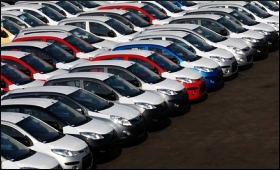|

|
Auto makers may export unsold non-BS IV vehicles
|
|

|
|
| Top Stories |
 |
|
|
|
SME Times News Bureau | 30 Mar, 2017
As the apex court on Wednesday banned the sale and registration of non-BS IV compliant vehicles, auto manufacturers are now said to be toying with the idea of exporting their unsold warehouse stocks -- about nine lakh.
Vinod K. Dasari, Ashok Leyland CEO and Society of Indian Automobile Manufactures (SIAM) President, reacted to the Supreme Court's decision saying that the inventory they would be left with would be exported to other markets.
"Majority of the vehicles in the pipeline have already been sold. Some more will be sold in next couple of days... Of the little inventory that we expect to remain beyond this, we will export them to other markets, where we have significant presence and still operate on BS III norms," Dasari said.
He added that the other vehicles would be upgraded to BS IV at minimal cost.
In a major boost to the clean air and anti-pollution crusade, the Supreme Court on Wednesday banned the sale of non-BS IV compliant vehicles from April 1 onwards.
The decision comes as a setback to several auto manufacturers, who despite several warnings from authorised environment agencies, held a huge stock of the old technology, BS III-compliant vehicles.
In its reaction, the SIAM said that the industry would abide with the orders passed by the apex court. The industry, however, added that the sudden order was "unfortunate".
"While no one pushed for BS IV fuel availability for seven years to change over faster, this sudden decision -- just a few days before the changeover -- is rather unfortunate as it causes undue stress on the entire industry and causes loss of jobs," the SIAM President added.
However, according to the apex court-appointed Environment Pollution (Prevention & Control) Authority (EPCA), despite several warnings, the automobile industry kept producing the BS III-compliant vehicles and Wednesday's decision would set an example for the polluters.
"The EPCA had given them six-month notice to stop manufacturing the old technology... Had they listened to us, then they would have had much less in their stock by the deadline," Sunita Narain, Director General of Centre for Science and Environment (CSE) and an EPCA member, told IANS.
The SIAM had earlier informed the EPCA that there would be as many as 20,000 passenger vehicles, 75,000 commercial vehicles, 47,000 three-wheelers and about 7,50,000 two-wheelers yet to be sold as of April 1.
According to some experts from the EPCA, the automobile industry may target markets in South America and neighbouring countries to sell the huge stock of four and two-wheelers.
Hailing the Supreme Court decision as a "landmark", Narain also expressed agreement with Dasari's claim that BS IV vehicles cannot run properly on BS III fuels.
"Ashok Leyland has sufficient capacity to make BS IV vehicles. However, since BS IV commercial vehicles cannot run properly on BS III fuel and such fuel is not available nationwide, our customers continued to buy BS III vehicles," said Vinod K. Dasari.
In 2016, the EPCA had observed that switching to BS IV fuel will help reduce air pollution by 80 percent through reduction in particulate matter (PM) emissions -- the major effluent in the air.
Earlier, the EPCA and union ministries of road transport and petroleum had decided that from April 1, 2017 onwards, BS IV oil shall be made available throughout the nation and mulled over stopping registration of BS III vehicles.
BS (Bharat Stage) IV and III are the fuel types based on vehicular emission standards fixed by the Indian government to regulate air pollution.
|
|
|
| |
|
|
|
|
|
|
|
|
|
|
|
|
|
|
| |
| Customs Exchange Rates |
| Currency |
Import |
Export |
US Dollar
|
66.20
|
64.50 |
UK Pound
|
87.50
|
84.65 |
Euro
|
78.25
|
75.65 |
| Japanese
Yen |
58.85 |
56.85 |
| As on 13 Aug, 2022 |
|
|
| Daily Poll |
 |
 |
| PM Modi's recent US visit to redefine India-US bilateral relations |
|
|
|
|
|
| Commented Stories |
 |
|
|
|
|
|
| |
|